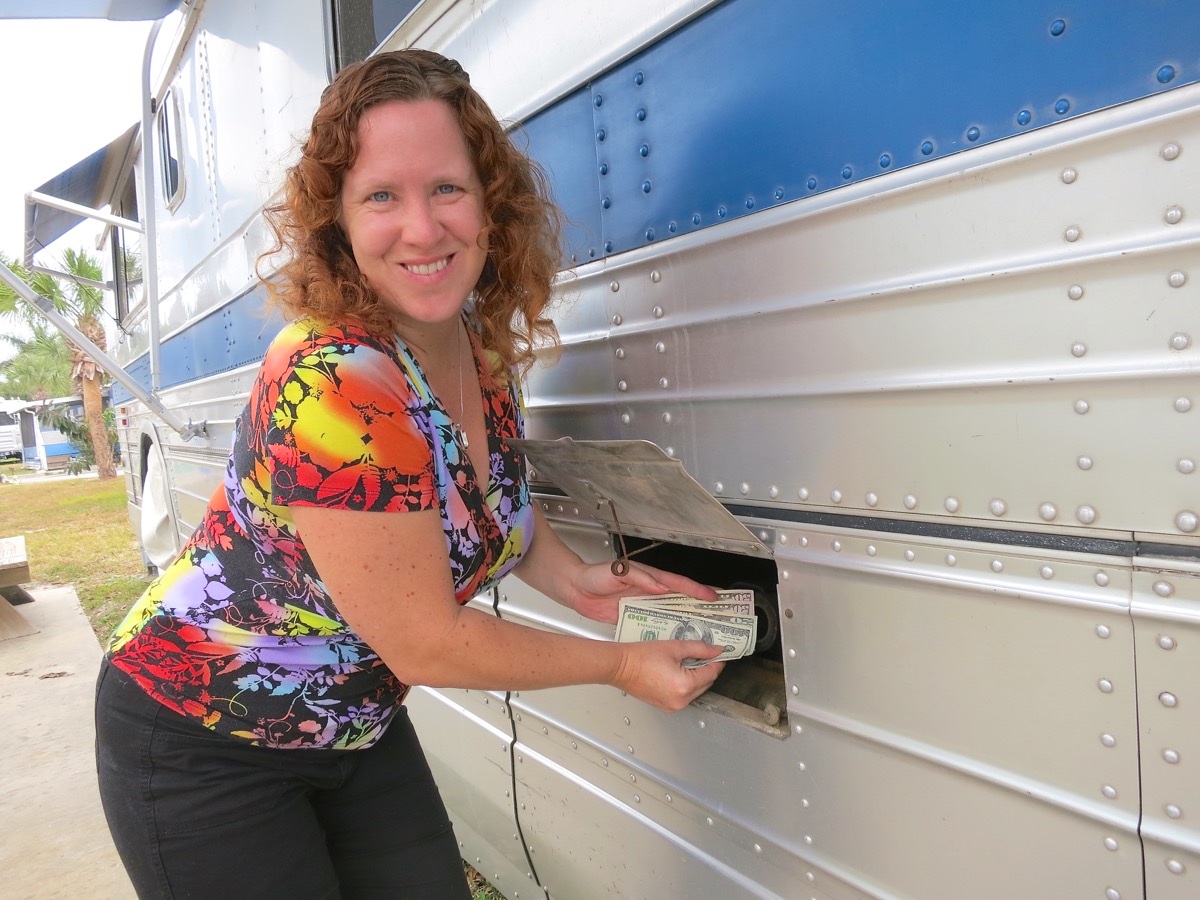
A life of perpetual motion in your own home that moves is a fantastic way to explore the world around us. We’ve enjoyed nomadic travels since 2006 in several types of RV and now also a motor yacht.
One of the very first concerns you’ll hear voiced about RVs and boats is how much fuel they burn to move and how expensive it is to fill their tanks.
We’ve heard comments like:
‘You must be RICH to keep fuel in that tank!’
And when fueling up a large motorhome at the gas station next to a small car, it never fails – someone comments on how they’re glad they don’t have our fuel bill.
And sure, if you’re driving your RV the same way you drive your daily commuter vehicle – it’s a very expensive transportation method. And if you’re just taking the RV or boat out for an excursion, the fuel to get to your destination is a definite expense to factor into your vacation budget.
RVs and boats just aren’t known for their fuel ‘economy’.
But most of us out here traveling long term don’t drive our homes like we do a car, and nor are our fuel expenses a vacation budget item… we look at our fuel costs differently.
More like pouring rent in the tank.
First, a video overview of this topic (caution this one is about 40m long – first a 20m presentation, the rest Q&A):
Driving fuel guzzling vehicles would make it seem logical that fuel costs should be a primary huge concern for us. But they simply aren’t – and here’s why:
Fuel is A Housing Cost
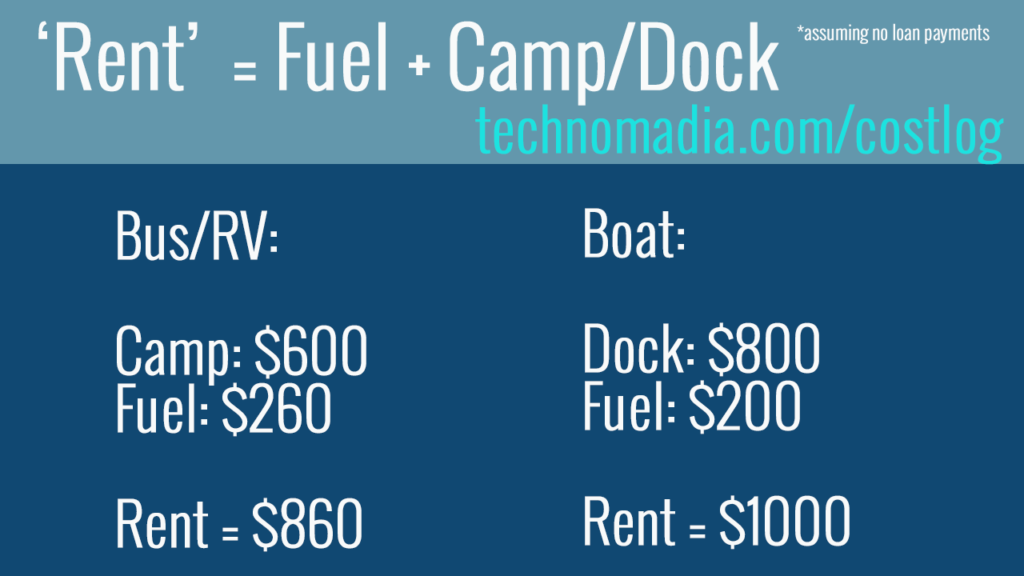
The biggest perspective shift for us is looking at our fuel costs more like a housing cost than a transportation cost.
Our RV and boat are our homes after all, and we’re choosing a lifestyle in which we are frequently moving them.
We shifted our thinking to consider our combined fuel costs and campground/marina fees to pretty much replace our old stationary mortgage/rent payments.
When we’re filling our tank, we’re pouring rent in the tank.
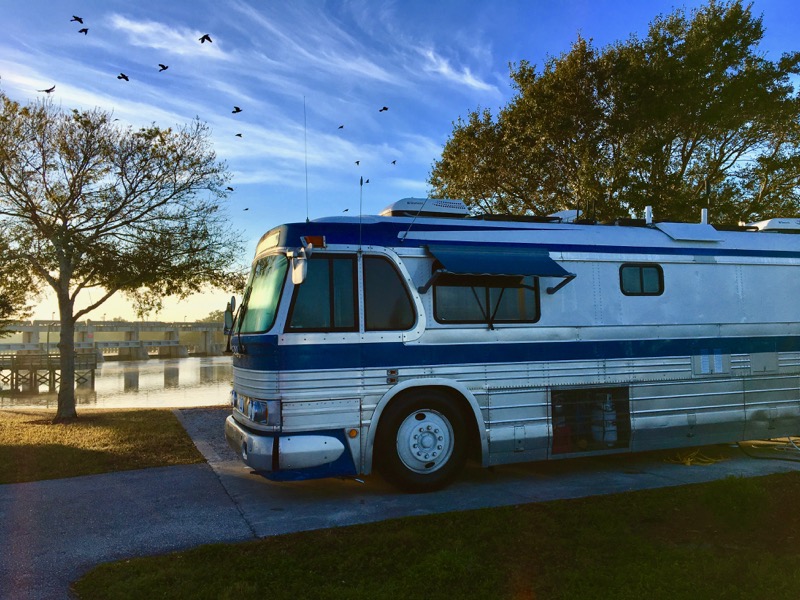
But unlike a mortgage or rent payment they are not a fixed cost. We have total control over choosing how much we want to spend in any given month.
And not to mention, when we want to change locations we don’t have to worry about breaking leases, going through escrow or packing up all our belongings into boxes.
We’re enjoying constantly changing and often times million dollar views.
And it only costs us a couple pizzas to move our home on down the road.
We’re keeping things simple here..
If you have a monthly loan payment on your RV or boat – you may also need to factor that into your ‘rent’ costs.
And you can pretty much anticipate that your RV or boat is a depreciating asset that will require maintenance to keep operational.
So what you consider your monthly mobile rent may vary depending on how you categorize things.
Fuel Is a Relatively Small Budget Item
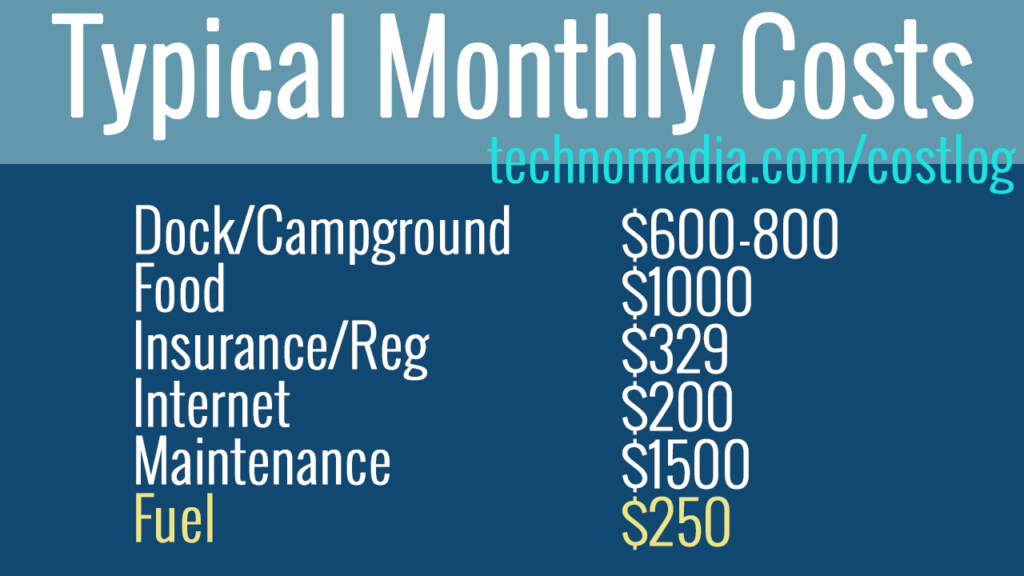
No one is going to confuse us with being minimalists – we’re solidly mobile middle class still in the prime of our income earning years.
Fuel is actually one of our smaller line items in our budget.
Food and campground/marina fees are bigger costs.
And maintenance (particularly on our boat – we factor in 10% of our purchase price a year) is a huge line item in our expenses.
And others like insurance (shown in the chart is just RV/boat insurance.. we also have health insurance), registration and connectivity come in higher.
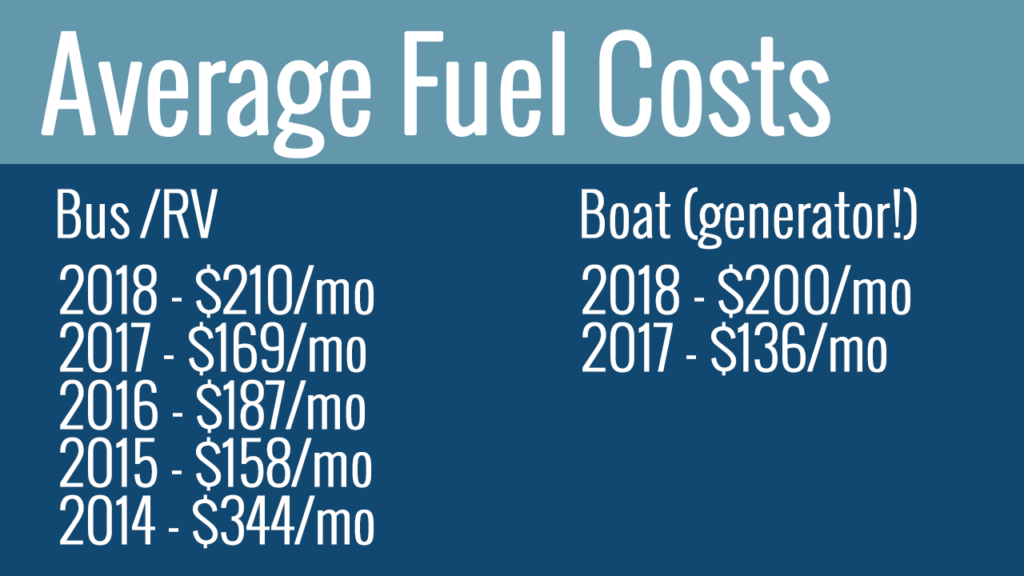
And then of course, there’s expenses that we voluntarily take on like our entertainment budget for getting out exploring the places we’re visiting.
And let’s not even mention the technology we’re so drawn to (ahem, thanks Mavik – new drone to buy) and constant home improvement projects.
Seeing how small a percentage of our overall costs fuel makes up, lets us not stress too much about it. Fuel costs may however represent a larger line item in the budget for someone living on a more frugal income.
We’ve shared our monthly travel expenses for several years. You’re welcome to view our cost log with even more thoughts on each of these budget lines.
We Control How Many Miles We Drive
Just because you have a house with an engine and propulsion, doesn’t mean you have to drive it non-stop.
And you’re only filling your huge tanks up after burning through miles and miles of fuel. Keep in mind, an RV or boat is also made to be a comfortable living space and is pretty happy parked for a bit.
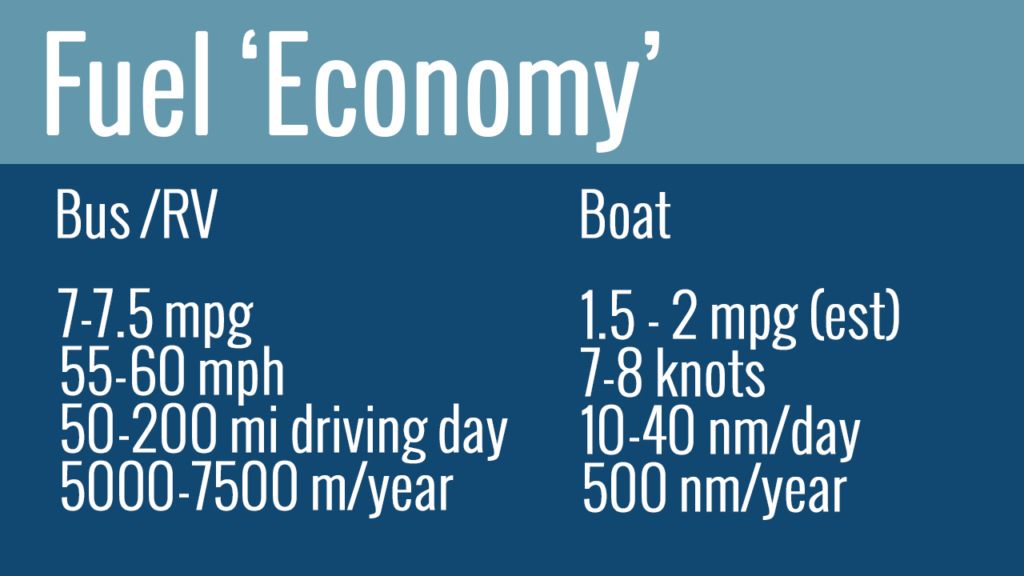
In other words, you get to control how many miles you drive in a given month and thus how much fuel you’re consuming.
Sure, our RV (a vintage bus conversion) only gets 7-7.5 miles per gallon and it takes 140 gallons to fill our tank.
And our boat (a dual engine motor yacht) only gets 1.5 – 2 miles to the gallon, and takes 440 gallons to fill. Our generator also uses fuel from the same tank.
But the number that really impacts the bottom line is how many miles we move.
In a typical year of full time RVing, we maybe cover 5000-7500 miles.
In our boat, so far we’re not doing much more than 500 in a year.

That’s the primary reason why our fuel costs are such a small line item in our budget.
We tend to fill our tanks when they get just below 1/2 (always keeping plenty of emergency fuel range, leeway for faulty gauges and sloshing around of fluids in a big tank).
That means a fill up in the boat might cost us $600… which is a frightening number.
But it’s a heck of a lot easier to stomach that number when we realize we may only need to fill up once every 3 or 4 months at our pace. So we focus on our monthly/annual costs, not the cost per fill.
It’s important to keep in mind, we don’t chose how many mile we move just to save on fuel – it’s the pace that has been most sustainable for us long term. Being in constant motion can become tiring. Constantly juggling logistics, finding your next spot, maintenance, risking break-downs and navigating around weather.
We enjoy getting to know the places we’re traveling to and immersing ourselves for a bit in community and local things. And we also have to squeeze in those work hours somewhere.
We anticipate the balance between our cruising/RVing miles will shift over the years.
Aside from our housing miles, we do have a small car for local area land exploring and moving between our vessels, and a dinghy for water explorations. Both sip fuel in comparison to our houses.
The next time someone gloats about their $25 fuel fills versus our $250 at the gas station, perhaps we’ll just bring out a slideshow of all the views our last tank afforded?
Fuel Consumption is Voluntary
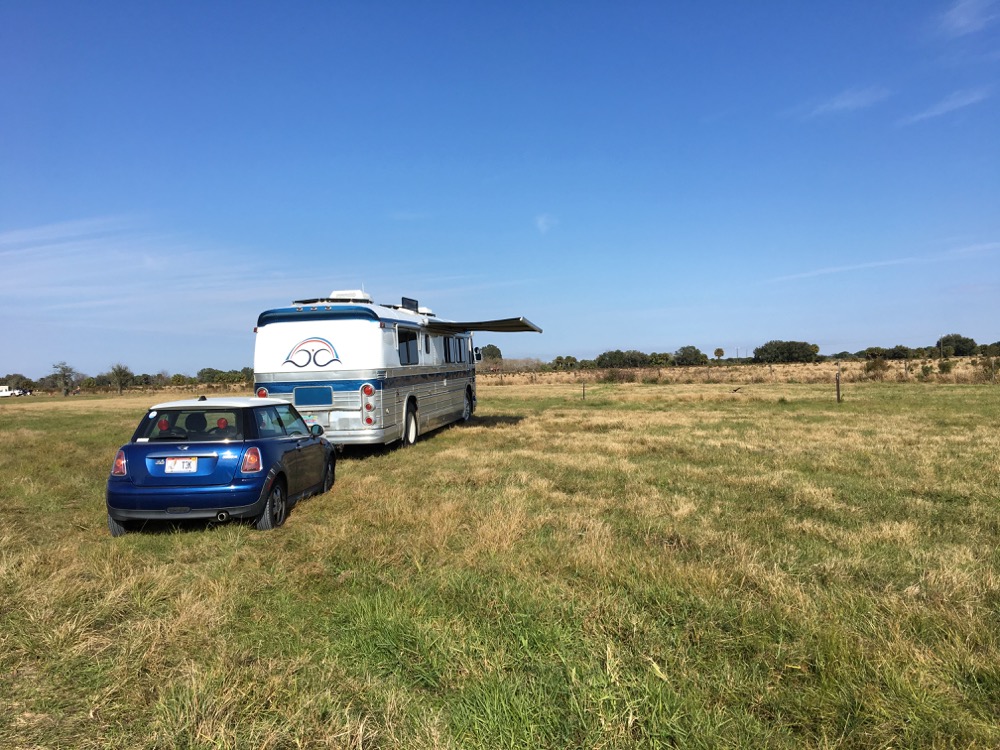
Back in our stationary days one of us had a J-O-B that required us to be onsite, that meant we had to transport ourselves to work. Usually by car.
When fuel prices went up or the distance between work and home changed, we had to absorb the increased prices to keep the paycheck coming in.
Many full timers either work from home, park close by their local job site or are retired – meaning mandatory commuting expenses are not as common.
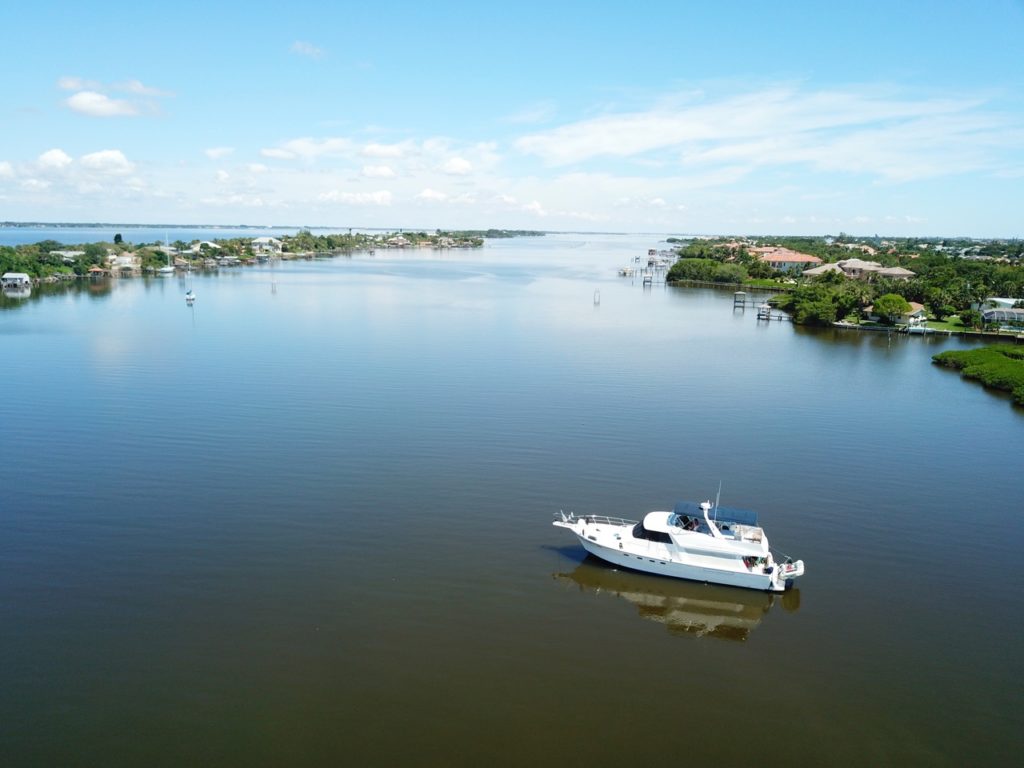
We work from home now (well, I always did.. Chris was the crazy commuter.. dude, seriously – 80 miles per day??), so we don’t have commuting expenses.
Meaning most of our fuel costs are voluntary.
If our income doesn’t allow for a lot of miles this season, we can slow down our pace and find cheaper monthly stays, boondock on public land, anchor out, workamp/volunteer in exchange for low cost options or driveway/dock surf with gracious hosts.
One month we may fund a big repositioning with higher fuel costs. And the next month or two we may plop ourselves down in one spot and let the fuel just sit in the tank.
Oh, and because we’re combining exploratory travels with our everyday life – we’re don’t take as many road trips away from home, like we had to when stationary to keep the wanderlust itch at bay.
The flexibility of being able to choose your pace to match your budget (or budget around your choice in pace) is amazing.
Options for Saving On Fuel
Aside from choosing our pace of travel to cut the fuel costs, full time travelers have some options for fuel savings that our former stationary selves didn’t even think about.
For one, we’re usually not in a rush and can drive our beasts at the most optimal speeds for fuel economy.
We also have agility to plan our fill ups in locations with lower fuel taxes and prices.
Stationary folks are used to paying the prices in their neighborhood or along their typical route, it doesn’t make sense to drive a few dozen miles just to get a cheaper price.
Because our RV and boat tanks are huge, we have a lot of safe range. If we know fuel ahead on our route will be lower, we hold off on filling up to save a few bucks.
We use our State Lines app to know state fuel taxes when we’re close to state lines.
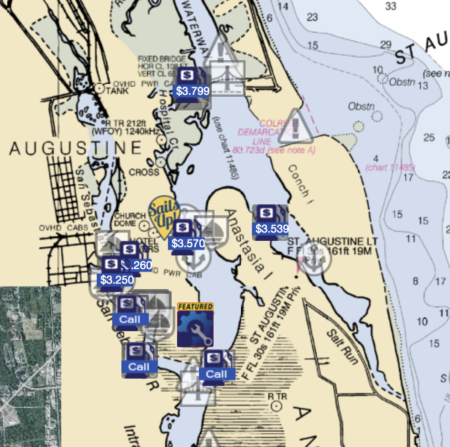
RV Savings Fuel Tips
When RVing, we default to Gas Buddy for finding the best prices at specific stations. And we use a credit card that gives cash back on fuel purchases to save a little more.
There are fuel clubs with some brands too, but we typically find their starting price plus discounts is still higher than other fuel choices.
Boat Fuel Savings Tips
When boating, we use Waterway Guide and Southeast Salty Cruisers for finding the best fuel dock prices.
And while many fuel docks don’t qualify for credit card gas perks (they’re generally not mainstream station brands), we do find that many docks are flexible in their pricing. Offering discounts for cash/check payments, bulk quantities, marina stays or for club memberships (such as BoatUS).
And you sometimes have the option of scheduling a fuel truck to meet you shoreside for a direct fill at bulk pricing.
Another perk of marine fuel is that you don’t pay some road-taxes – but typically the fuel-dock luxury cost brings the price back up close to street price that vehicles are paying.
Price Fluctuations Don’t Actually Amount to Much
But honestly, we don’t stress too much about the actual price per gallon and don’t freak out much when fuel prices edge upwards. It of course makes a difference and we avoid pricing gouging pumps – and it sucks to pay more for something today than we did last month.
With our pace of travel, it would have to be a pretty significant fluctuation to impact our bottom line all that much.
I created this little spreadsheet calculator based on our typical annual mileage to show the actual impact on our monthly and annual costs by per gallon pricing – which really helped us let go of always seeking the absolute lowest price:
Want to play around with these calculations for your situation? I set this up as a public Google Docs Fuel Fluctuation Calculator, and you’re welcome make a copy.
So we prioritize ease of access over actual fuel prices when selecting where we fill. We’re not going to risk getting pinned in a tight station, fighting tricky currents or veering too far off our route if there are easier options that might be a few cents more.
We’ve seen so many fuel price fluctuations (both up and down) since we hit the road in 2006 that we don’t let per gallon prices rule our lives. Everything from varying local tax rates to supply & demand economy factors impact the price we pay at the pump.
And life in general can hand us price increases that are more out of our control – like costs of food, camping options, insurance rates, maintenance parts, healthcare and more. At least with fuel costs, you can mitigate them with your pace of travel.
We just roll with it, keep it all in perspective and remember we choose our awesome life of mobility.
For us, it’s all about the lifestyle!

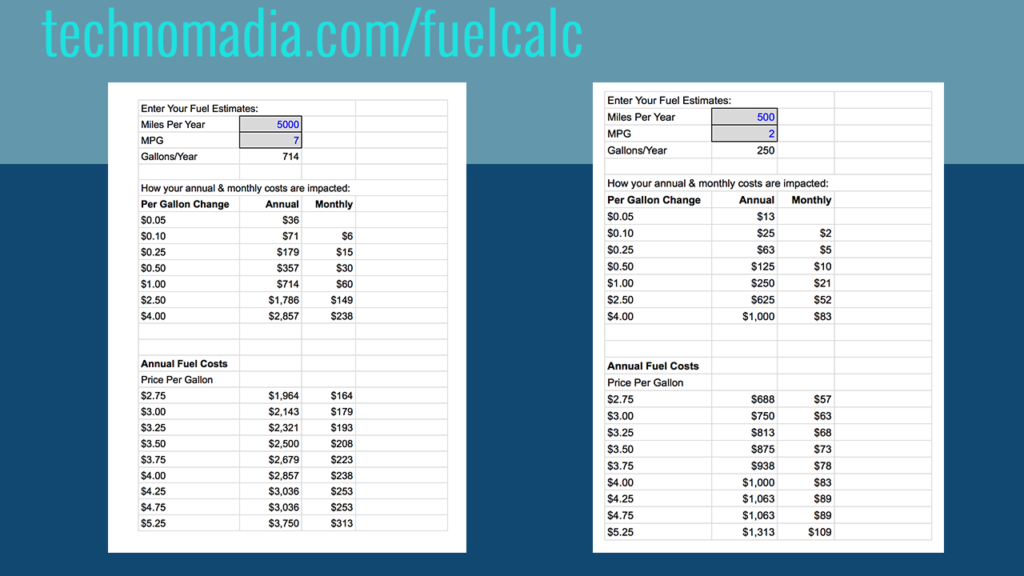
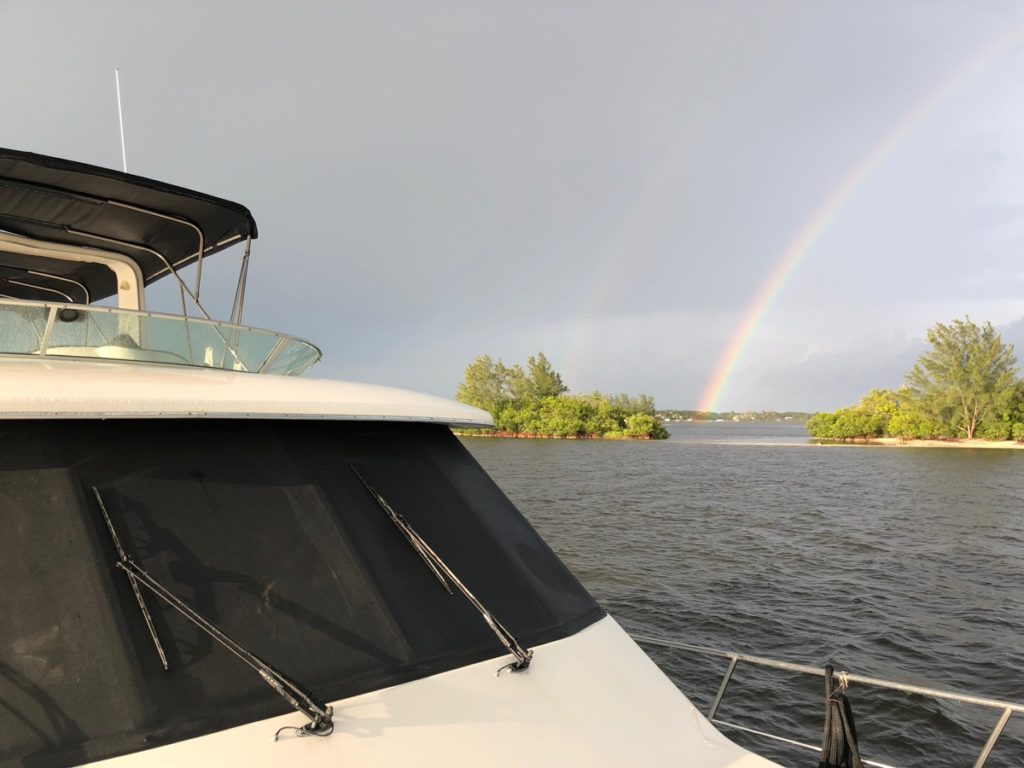
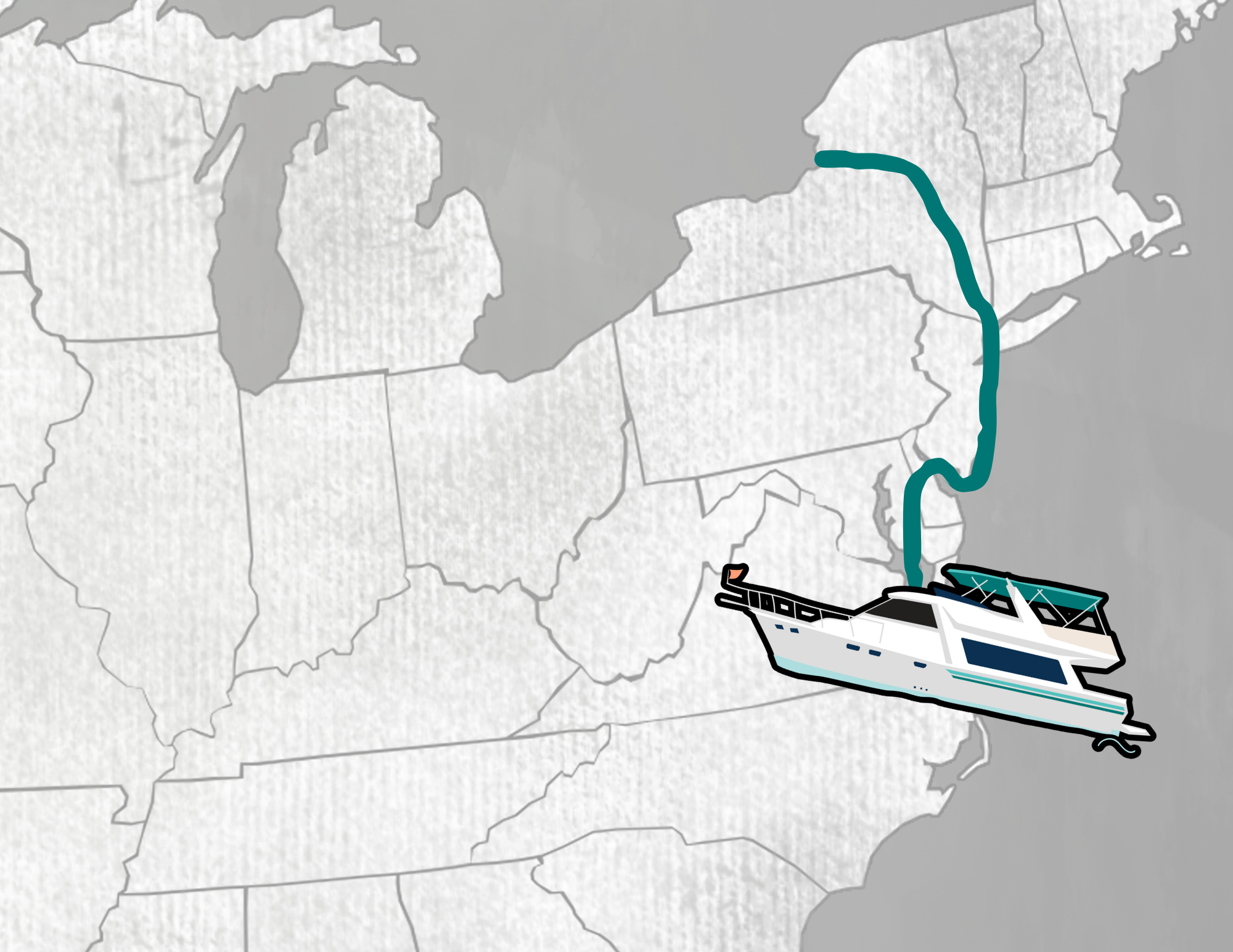
We should be retired but our ecommerce business keeps us working. We brought a 95 Dolphin 35ft MH with the intention of leaving our stick and brick and full time Rv’ing but soon enough the reality started to set in. Our biggest problem is our business which requires us to be customer support and sales about 40 hours a week .. yes a J-O-B. That said, without the job our SS income is not enough to pay either the s&b or to keep us on the road so it’s a dilemma. We could sell the business but it wont bring more than a few short years of freedom and then it’s hard times going forward.
In our s&b we have true unlimited HS internet. We probably use 150 to 200GB of data just for the business needs every month. We use it for voip, email, website maintenance, live chat and surfing and with cellular data plans being throttled at 20GB using a hotspot requires a lot of plans just to keep connected, assuming we can even get connected which means a lot of campground fees on top of that.
I saw that your internet cost is a mere $200 mth … ours would likely be 5 times that which makes the mortgage on our s&b look cheap. We have a cell booster and wifi ranger on the roof, but the available plans just make it a no-go or a very expensive go. How on earth can we break free!!
There are lots of options for mobile internet.. make sure you’re tracking the options along with us in our ‘day job’ over at the Mobile Internet Resource Center. Particularly, here’s our guide to the current best data plan options for high bandwidth needs: http://www.rvmobileinternet.com/planpicks
Thank you again for sharing your adventure with us
love the Geek in you both – kinda fun to learn from you and then try it ourselves
haven’t tried Pokemon – but will now check it out
and really appreciate your detailed blog post with all the tips & links
After being on the road for 20months we are still working out kinks and needed to revisit our budgeting so that part of the chat was really helpful
and its just fun to see you both enjoying your adventure – You seem so happy these days – fun to see
Hi Sherry,I have been boating since 1971 I have had 7 boats from a 16 footer to a 50 footer all of my boating have been in the Potomac river / Chesapeake Bay area, I did the great loop 25 years ago in a 28 foot single engine boat, it took me a little over a year to do it, I am now into RV,s to me it is like night and day difference,s there is so much involved in boating mainly the weather, and not to mention all the things that can go wrong in a boat in which I know you know.
I am done with boating got tide of thowing money into a hole in the water,winterising,bent props,busted hoses,wind,ruff seas,running a ground,bottom paint cost keep rising, 35 gallons a hour fuel burn rate I could go on an on but with my bad spelling I will stop here, you two are young, enjoy it,s time for me to settle down in my condo in Fort Lauderdale an take trips in my Rv ,I know you no not to start that trip north in the winter and I know you now realise you should not have been in Florida during the stormy season, just saying…
any how good luck on your jouney.
From an Old Salty Dog….
Enjoy the RVing.. it’s a great way to travel with many perks. And wow, 35 gallons per hour?!?! That’s crazy. Thankful ours is running around 3 – 3.5.
In 2008, attempting to save 5 cents/gallon, I pulled into a “Travel Center” to fill up the MH. I used the car lanes instead of the truck lanes. Upon exiting, I turned the wheel too sharp and hit the concrete block that was protecting the pump. Destroyed two bay doors and one fiberglass fender. In addition to the $500 deductible, it took two months to get repaired and changed our travel plan for two months after that!! So… when you say don’t sweat the price differences, I hear you loud and clear.
Ouch…that’s a painful way to learn the value of those savings. Thanks for sharing, hopefully it’ll help reinforce the point for others.
Nice job Cherie! More than once I’ve responded with “I’m glad I don’t have to pay a mortgage or mow the lawn” when someone at the pump says they’re glad they don’t have to fill that big tank We’ve been moving more this summer than usual and so far have absorbed the fuel costs into the budget. Having said all that – it’s still painful to see that number on the fuel pump :-)))
We’ve been moving more this summer than usual and so far have absorbed the fuel costs into the budget. Having said all that – it’s still painful to see that number on the fuel pump :-)))
Yeah, writing a check for $600 for fuel is always a shocker for us (both the writing a check part and the cost). I wrote this article in part to re-read and remind myself… Have a fabulous remainder of your summer!
Thanks Cherie, you must have read my mind My wife and I are about to become RV full-timers and I’ve been stressing out a bit about the high cost of filling our motorhome’s 110 gallon fuel tank, so your post was very timely and was the perspective reminder that I needed. Thanks again for sharing your hard-earned wisdom with us.
My wife and I are about to become RV full-timers and I’ve been stressing out a bit about the high cost of filling our motorhome’s 110 gallon fuel tank, so your post was very timely and was the perspective reminder that I needed. Thanks again for sharing your hard-earned wisdom with us.
Glad the perspective can help remove a bit of the stress… exciting adventures ahead of you, and lots of new experiences.
Excellent data, but I think you eat a lot better than I do! When people comment about my gas usage as I am filling up my 55 gallon motorhome tank at a gas station, I ask them how much they spend each month for heating their homes. Then I tell them I average about $250 per year for propane and almost never pay an electric bill, beyond what I pay for a campground. I also remind them that I do not pay property taxes. That usually gets them thinking.
It’s fun to see their minds start to think differently… and turning the shock of fuel costs into envy over the lifestyle. I often wonder how many gas station encounters have results in future nomads.
And for sure, our food costs definitely don’t qualify as minimal – we enjoy experiencing local food options, it’s a big part of our exploring a new location and our social life.
Another great post, Cherie! I’m a landlubber my nature, but still find the comparisons interesting. Thanks for taking the time to put it all together in such a thoughtful presentation.
Glad it helps even those not actively mobile.
Thank you for reminding us how little that extra 25 cents/gal impacts our total travel/vacation budget!
I was so in the habit of thinking only about the cost per gallon and seeking the absolute best price. And freaking out when prices went up. Seeing the overall annual impact really helped me keep it in perspective.. hopefully the reminder can help others reduce stress a bit too.